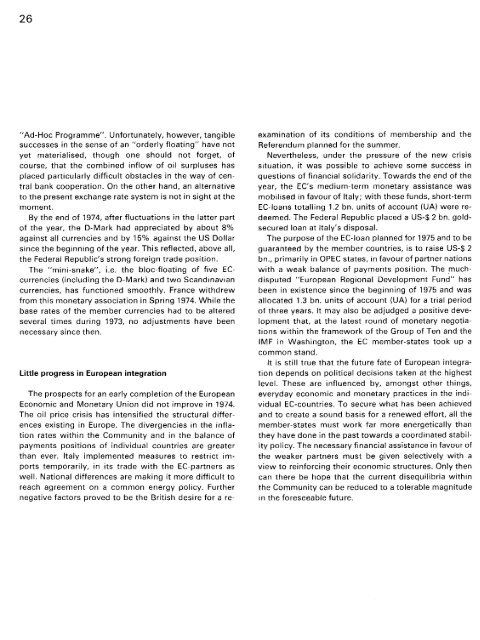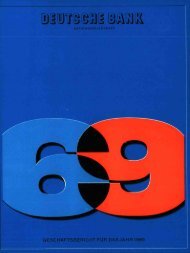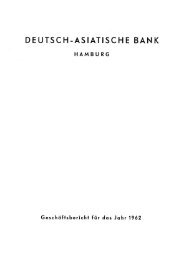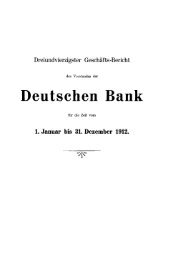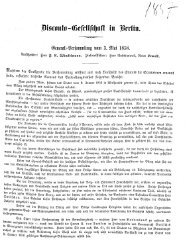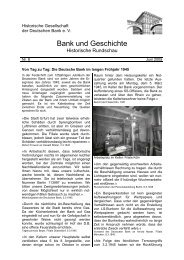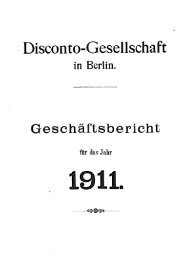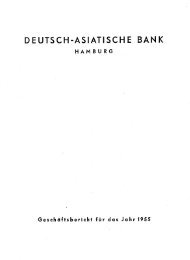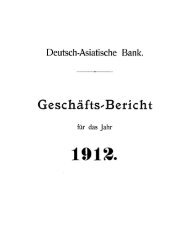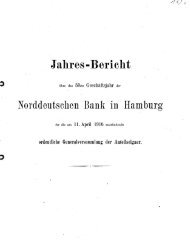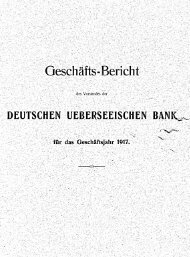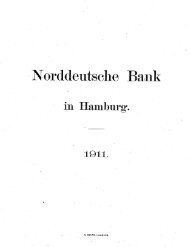Deutsche Bank 1 - Historische Gesellschaft der Deutschen Bank e.V.
Deutsche Bank 1 - Historische Gesellschaft der Deutschen Bank e.V.
Deutsche Bank 1 - Historische Gesellschaft der Deutschen Bank e.V.
Create successful ePaper yourself
Turn your PDF publications into a flip-book with our unique Google optimized e-Paper software.
"Ad-Hoc Programme". Unfortunately, however, tangible<br />
successes in the sense of an "or<strong>der</strong>ly floating" have not<br />
yet materialised, though one should not forget, of<br />
Course, that the cornbined inflow of oil surpluses has<br />
placed particularly difficult obstacles in the way of cen-<br />
tral bank cooperation. On the other hand, an alternative<br />
to the present exchange rate system is not in sight at the<br />
moment.<br />
By the end of 1974, after fluctuations in the latter Part<br />
of the year, the D-Mark had appreciated by about 8%<br />
against all currencies and by 15% against the US Dollar<br />
since the beginning of the year. This reflected, above all,<br />
the Fe<strong>der</strong>al Republic's strong foreign trade position.<br />
The "mini-snake", i.e. the bloc-floating of five EC-<br />
currencies (including the D-Mark) and two Scandinavian<br />
currencies, has functioned smoothly. France withdrew<br />
frorn this rnonetary association in Spring 1974. While the<br />
base rates of the mernber currencies had to be altered<br />
several times during 1973, no adjustments have been<br />
necessary since then.<br />
Little Progress in European integration<br />
The prospects for an early completion of the European<br />
Economic and Monetary Union did not irnprove in 1974.<br />
The oil price crisis has intensified the structural differ-<br />
ences existing in Europe. The divergencies in the infla-<br />
tion rates within the Cornrnunity and in the balance of<br />
payments positions of individual countries are greater<br />
than ever. ltaly implemented measures to restrict im-<br />
ports ternporarily, in its trade with the EC-partners as<br />
well. National differences are rnaking it rnore difficult to<br />
reach agreernent on a cornrnon energy policy. Further<br />
negative factors proved to be the British desire for a re-<br />
examination of its conditions of membership and the<br />
Referendum planned for the summer.<br />
Nevertheless, un<strong>der</strong> the pressure of the new crisis<br />
situation, it was possible to achieve sorne success in<br />
questions of financial solidarity. Towards the end of the<br />
year, the EC's medium-term rnonetary assistance was<br />
rnobilised in favour of Italy; with these funds, short-term<br />
EC-loans totalling 1.2 bn. units of account (UA) were re-<br />
deemed. The Fe<strong>der</strong>al Republic placed a US-$2 bn. gold-<br />
secured loan at Italy's disposal.<br />
The purpose of the EC-loan planned for 1975 and to be<br />
guaranteed by the member countries, is to raise US-$ 2<br />
bn., primarily in OPEC states, in favour of Partner nations<br />
with a weak balance of payments position. The much-<br />
disputed "European Regional Development Fund" has<br />
been in existence since the beginning of 1975 and was<br />
allocated 1.3 bn. units of account (UA) for a trial period<br />
of three years. It may also be adjudged a positive deve-<br />
lopment that, at the latest round of monetary negotia-<br />
tions within the framework of the Group of Ten and the<br />
IMF in Washington, the EC member-states took up a<br />
common stand.<br />
It is still true that the future fate of European integra-<br />
tion depends on political decisions taken at the highest<br />
level. These are influenced by, amongst other things,<br />
everyday economic and monetary practices in the indi-<br />
vidual EC-countries. To secure what has been achieved<br />
and to create a sound basis for a renewed effort, all the<br />
member-states must work far more energetically than<br />
they have done in the past towards a coordinated stabil-<br />
ity policy. The necessary financial assistance in favour of<br />
the weaker Partners rnust be given selectively with a<br />
view to reinforcing their econornic structures. Only then<br />
can there be hope that the current disequilibria within<br />
the Community can be reduced to a tolerable magnitude<br />
in the foreseeable future.


